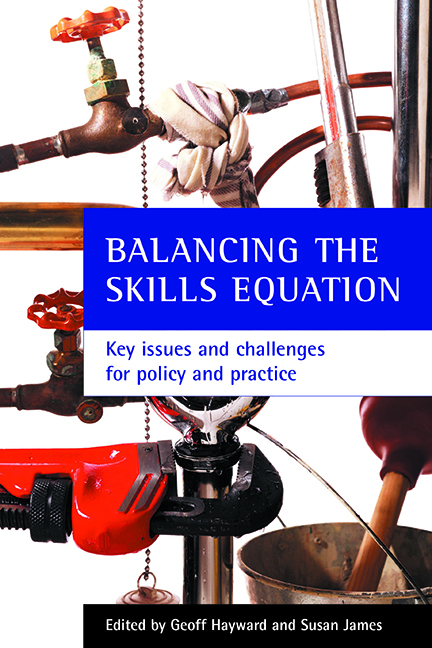Book contents
- Frontmatter
- Contents
- Acknowledgements
- Preface
- Notes on contributors
- one Producing skills: conundrums and possibilities
- two Fit for purpose? Sixty years of VET policy in England
- three The European policy regarding education and training: a critical assessment
- four ‘I can’t believe it’s not skill’: the changing meaning of skill in the UK context and some implications
- five Qualifying for a job: an educational and economic audit of the English 14-19 education and training system
- six Does apprenticeship still have meaning in the UK? The consequences of voluntarism and sectoral change
- seven Tradition and reform: modernising the German dual system of vocational education
- eight Learning in the workplace: reappraisals and reconceptions
- nine Interests, arguments and ideologies: employers’ involvement in education–business partnerships in the US and the UK
- ten Compatible higher education systems and the European labour market: Bologna and beyond
- eleven The expansion of higher education: economic necessity or hyperinflation?
- twelve Becoming a chef: the politics and culture of learning
- Index
- Also available from The Policy Press
eleven - The expansion of higher education: economic necessity or hyperinflation?
Published online by Cambridge University Press: 20 January 2022
- Frontmatter
- Contents
- Acknowledgements
- Preface
- Notes on contributors
- one Producing skills: conundrums and possibilities
- two Fit for purpose? Sixty years of VET policy in England
- three The European policy regarding education and training: a critical assessment
- four ‘I can’t believe it’s not skill’: the changing meaning of skill in the UK context and some implications
- five Qualifying for a job: an educational and economic audit of the English 14-19 education and training system
- six Does apprenticeship still have meaning in the UK? The consequences of voluntarism and sectoral change
- seven Tradition and reform: modernising the German dual system of vocational education
- eight Learning in the workplace: reappraisals and reconceptions
- nine Interests, arguments and ideologies: employers’ involvement in education–business partnerships in the US and the UK
- ten Compatible higher education systems and the European labour market: Bologna and beyond
- eleven The expansion of higher education: economic necessity or hyperinflation?
- twelve Becoming a chef: the politics and culture of learning
- Index
- Also available from The Policy Press
Summary
Introduction
Concern about the expansion of higher education (HE) in western Europe and North America is not a recent phenomenon. Major changes took place in the 19th century that prepared the way for increased participation (Curtis and Boultwood, 1966) and, with the acceleration of the process since the end of the Second World War, HE has become de facto part of the national system of education in most European countries.
Recent growth has raised concerns that are not entirely dissimilar from those expressed when primary and, in particular, secondary schooling expanded during the course of the 19th and 20th centuries. The history of the development of formal education, both in terms of participation rates and the lengthening of study-time, has gone hand in hand with a critical questioning of its real necessity, its usefulness and even its potential drawbacks and dangers. Mandeville’s criticisms of charity schools (Mandeville, 1732), Schumpeter’s (1943) forecasts of growing dissatisfaction among ‘sub-employed’ graduates and today’s recurrent criticisms of expansionist trends in HE in the form of the ‘more means worst’, ‘dumbing down’ or ‘over-education’ debates share a suspicion of the worth of educational expansion. During the second half of the 20th century, the question of educational expansion attracted much attention and the debate revolved mostly around the evaluation of its socioeconomic benefits and costs. This chapter discusses a number of assumptions, which have underpinned the formulation of this debate.
The modality of expansion of HE
The notion of ‘expansion’ as applied to HE is an imprecise term, which needs to be examined in terms that go beyond an increase in volume or a greater number of students passing through the system.
First, the aggregate level at which the problem is being considered needs to be specified. The subject of expansion has most often been tackled on a national basis without any further justification or explanation, but it may be anticipated that geographical considerations will have implications for the way the question of the modalities of expansion is to be answered. The situation in Britain, for example, shows that the question may be tackled at a cross-national level (OECD, 1998a), a national level (Dearing, 1997), a regional level (Cubie, 2000) or even at a local level (for example, the insistence of certain regional authorities on having their own university).
- Type
- Chapter
- Information
- Balancing the Skills EquationKey Issues and Challenges for Policy and Practice, pp. 203 - 218Publisher: Bristol University PressPrint publication year: 2004

